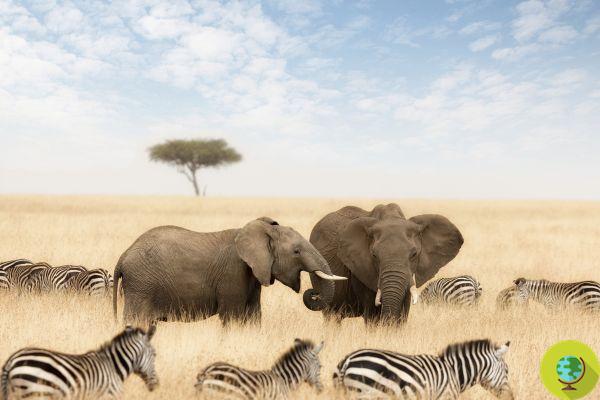
The South African government wants to change the Meat Safety Act, allowing the consumption of endangered species such as elephants, giraffes, crocodiles
The South African government wants to change the Meat Safety Act, allowing the consumption of threatened species such as elephants, giraffes, crocodiles, rhinos and many others. The intention is to commercialize the meat, but an ecological disaster is risked. For this reason, more than 45 thousand people oppose the plan to change the state law, which has regulated the production of meat since 2000.
The Minister of the Department of Agriculture, Land Reform has published an amendment for the modification of the Meat Safety Act which as we said, is a state law that establishes which animals can be bred and marketed in South Africa for their meat. This amendment would open up to the economic exploitation of 90 species in all including hippos, antelopes, wildebeest, zebras, gazelles, crocodiles, giraffes, elephants and rhinos, i.e. some of the animals that the IUCN, the International Union for the Conservation of Nature, has included in the red list of threatened species.
The consumption of bushmeat across the continent is already a species conservation problem. According to conservation groups, now, the fear is that the change in the law could lead to the creation of wet markets in South Africa. Individuals and small businesses are likely to see this as an opportunity to enter an industry where start-up costs are minimal, health standards difficult to enforce and supervision non-existent.
While the draft is being examined by the government, citizens and associations have united to oppose the plan: already 45 thousand have expressed their dissent on the Dear SA participatory platform.
"It is inconceivable to slaughter wild animals, especially endangered and nearly extinct species such as rhinoceros and elephants", reads and again, "The sale of any product derived from endangered species should be strictly prohibited", " The consumption of wild animals increases the real risk of zoonotic diseases ”.
In China, markets where dogs, cats and bats are eaten are reopening
The consequences of wildlife trafficking for the environment and public health would be devastating. Numerous animals would end their days at the slaughterhouse and all while a global pandemic is underway that attributes much of the responsibility to the consumption of wild animals. Currently, the law provides that 35 species of domestic animals and game can be consumed, but if the amendment were approved, birds, fish and reptiles as well as the aforementioned animals would also end up on the list.
'Inclusion of an animal in the Meat Safety Act program does not encourage the slaughter of those animals. Instead, it will allow regulators to have more control over how they are slaughtered for human and animal consumption, 'the department said. But it all shocked wildlife protection activists and welfare advocates like Tozie Zokufa, director of the Coalition of African Animal Welfare.
"In light of the circumstances we find ourselves in regarding Covid-19, we ask that the department recognize the risks and take action to protect health and animals."
Fonti:Republic of South Africa/ The Conversation/Meat Safety Act/GroundUp
Read also:
- Coronavirus: Vietnam bans the trade and consumption of wild animals due to the risk of a new pandemic
- Wuhan bans the consumption and trade of bushmeat for 5 years
- To prevent the next pandemic, we should be concerned about the legal wildlife trade


























